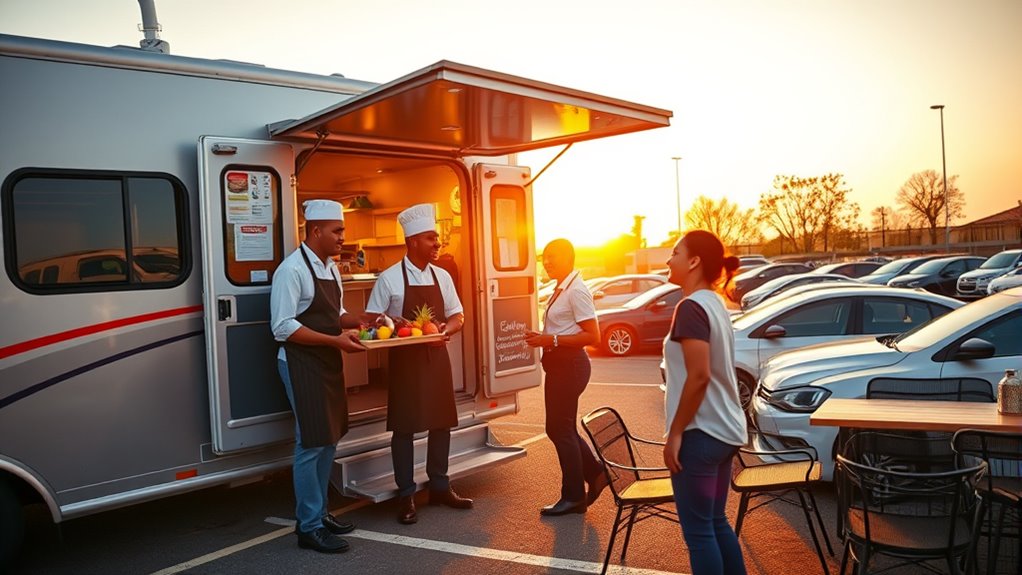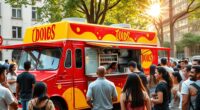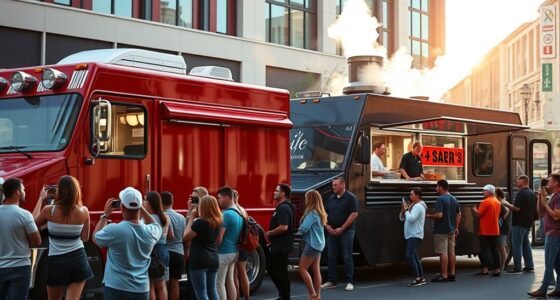To build your food truck team and staffing plan effectively, focus on matching skills with peak times using smart scheduling and software tools. Invest in thorough staff training to ensure top customer service and safety standards. Foster a positive work environment with open communication and recognition, which helps reduce turnover. Incorporate cross-training for flexibility and plan for contingencies with reliable part-time staff. Keep refining your approach to stay resilient—more strategies await if you explore further.
Key Takeaways
- Develop a staffing plan based on sales patterns, peak hours, and crew skills to ensure optimal coverage and efficiency.
- Implement effective crew scheduling software to match staff availability with busy periods and prevent overstaffing or shortages.
- Provide comprehensive training tailored to your menu and operations to ensure consistent customer service and safety standards.
- Cross-train team members to increase flexibility, cover absences, and adapt to new menu items or procedures smoothly.
- Foster a positive work environment through open communication, recognition, and reliable staffing to reduce turnover and boost morale.

Creating a strong food truck team is essential to guaranteeing smooth operations and delivering great customer service. When you’re building your staffing plan, one of your top priorities should be effective crew scheduling. It’s not just about filling shifts; it’s about matching your team’s skills and availability with your busiest times. Proper crew scheduling helps prevent burnout, reduces idle periods, and guarantees you’re fully staffed during peak hours. You’ll want to analyze your sales patterns and plan shifts accordingly, ensuring you have enough personnel to handle busy periods without overstaffing during slower times. Using scheduling software can streamline this process, allowing you to adapt quickly to changes and avoid last-minute staffing shortages. Consistent crew scheduling also fosters team cohesion, as your staff will get to know each other’s schedules and work better together.
Equally important is staff training. When you hire new team members, investing in their training sets the foundation for excellent customer service and efficient operations. Well-trained staff know how to handle food prep, serve customers, and maintain safety standards, which directly impacts your reputation. Training should be thorough but also tailored to your truck’s specific workflow and menu. Regular refreshers and ongoing education keep your team sharp and adaptable to new menu items or procedures. Remember, a knowledgeable team is more confident, which translates into faster service and happier customers. Cross-training employees in different roles can also improve flexibility, allowing you to cover shifts more easily and keep operations running smoothly even if someone calls out.
Building a cohesive team means more than just scheduling and training; it’s about fostering a positive work environment. Encourage open communication, recognize good performance, and address issues promptly. When your staff feels valued and understood, they’re more likely to stay committed and deliver the quality experience your customers expect. As you plan your staffing, consider turnover rates and plan for contingencies, such as having a pool of reliable part-time staff or on-call helpers. This proactive approach minimizes disruptions and keeps your truck running smoothly. Ultimately, by focusing on strategic crew scheduling and thorough staff training, you create a dependable, motivated team that can handle the demands of your food truck business and ensure your customers get the best possible experience every time.
Frequently Asked Questions
How Do I Find Reliable Staff for My Food Truck?
You find reliable staff by using effective recruitment strategies like posting on local job boards, leveraging social media, and asking for referrals from trusted sources. Focus on team leadership by clearly communicating expectations and fostering a positive work environment. This approach attracts dedicated employees who are committed to your food truck’s success. Regularly evaluate performance and offer training to build a dependable, motivated team that keeps your operations running smoothly.
What Are the Key Roles Needed on a Food Truck Team?
You’d think a food truck crew could just be you and maybe a buddy, right? Not quite. The key roles include a driver, cook, cashier, and cleaner—each essential to keep things running smoothly. Staffing challenges are real, but having a reliable crew ensures efficiency and quality. So, don’t underestimate these roles; they’re the backbone of your food truck’s success, and skipping them only makes your journey harder.
How Do I Train Staff for Food Safety and Customer Service?
You should start by providing thorough food safety protocols training, emphasizing proper handling, sanitation, and temperature control. Then, focus on customer service training by teaching staff how to communicate effectively, handle complaints, and create a welcoming atmosphere. Role-playing scenarios can help. Regular refreshers guarantee standards stay high. By actively involving your team and practicing these skills, you’ll ensure safety and excellent service on your food truck.
What Legal Requirements Exist for Hiring Food Truck Employees?
When hiring food truck employees, you must comply with employment law, which includes verifying legal work eligibility and adhering to wage and hour regulations. Additionally, you need to meet licensing requirements, such as obtaining a food handler’s permit and any necessary business licenses. Make certain your hiring practices follow anti-discrimination laws, and keep proper records of employment documents to stay compliant and avoid legal issues.
How Can I Motivate and Retain My Food Truck Team?
You can motivate and retain your food truck team by recognizing their efforts through team recognition programs and offering employee benefits like flexible schedules or discounts. Show appreciation regularly, celebrate milestones, and listen to their feedback. When you create a positive environment and value their contributions, your team feels appreciated and stays motivated, reducing turnover and boosting overall performance. These strategies foster loyalty and make your food truck a great place to work.
Conclusion
So, now that you’ve got your dream team in place, just remember: running a food truck is basically like herding caffeinated cats. Expect chaos, embrace the surprises, and maybe invest in a good sense of humor (and a fire extinguisher). With the right staff, you’ll be flipping burgers and cracking jokes in no time—just don’t forget, behind every great food truck is a crew that’s barely surviving on caffeine and sheer willpower.









